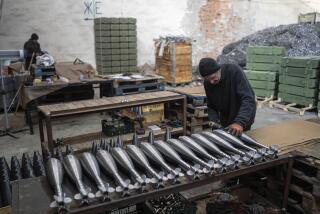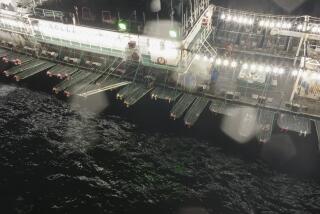In Poland, agents of change become its victims
- Share via
GDYNIA, POLAND — This shipyard is orphaned now, closed off from the world, storied old walls smeared with graffiti, cranes frozen over the Baltic tides. It is up for sale, but nobody offers to buy.
The shipyards scattered along Poland’s northern coast linger at the base of the country’s view of itself. The labor union of shipbuilders and technicians first cracked, then slowly eroded, communism’s grip on Poland and, by extension, the rest of Eastern Europe. Workers struck, organized and made demands; they stuck to their fight even in the face of bloody repression and martial law.
Through everything that came later -- the rise from communism and reinvention through privatization, capitalism and European Union membership -- the shipyards remained a touchstone of Poland’s national identity.
But sometimes the agents of change live long enough to become its victims. Today, the same shipyard workers who mounted the electrifying Solidarity labor union strikes find themselves unemployed. The fate of the yards themselves hangs like a politically laden albatross from the government’s neck.
The shipyards have stayed vital for decades because of government subsidies; but the European Union is forcing Poland to privatize the yards -- or sell the parts for scrap and close them for good.
“We knew it. Deep in our hearts, we expected it,” said Bogdan Smokinski, who worked in the shipyard for 43 years. He was laid off in May, and is studying computers in hopes of finding another job.
In the iconic strikes of 1980, Smokinski was a newlywed who left his pregnant wife at home to hole up in the shipyard with the other striking workers. He still brags about the glory days of Polish ship manufacturing, when “people knew Poland for our ships.”
He thought he’d work here for the rest of his life. Like other workers, he is bitter over the government’s failure to preserve the shipyards. “The reality is very brutal,” he said. “On our backs there’s a group of people who made their careers.”
It was here, in industrial cities strung along the Baltic coast, that Poland’s battle against communism was waged and won. It was in Gdansk that an electrical technician named Lech Walesa hopped over a shipyard wall to take charge of a strike. Walesa would later win the Nobel Peace Prize and become Poland’s first post-communist president.
Mindful of their history and a general sense of social gratitude -- not to mention the political weight of the workers and their outspoken union -- the government has propped up the shipyards for years with billions of dollars in subsidies.
The European Union, however, concluded that the subsidies had given the Polish shipbuilders an unfair edge over competition in the rest of Europe. The shipyard in Gdansk was sold in 2007 to a Ukrainian industrial conglomerate. The other two -- one in Szczecin and the other the one in Gdynia -- were closed down amid fruitless attempts to sell them to a private investor.
A frustrated Polish prime minister threatened to sack his treasury minister if the shipyards weren’t sold off by the end of this summer. And for a flash, it looked as if a buyer had emerged -- an anonymous figure working through a Qatari investment bank offered about $159 million for the two shipyards at auction.
But the midnight deadline to deposit the down payment rolled around in August, and the shadowy investor failed to deliver. The shipyards were thrown back into limbo.
The treasury minister kept his job, and the government took out another round of advertisements, hoping to unload the shipyards.
These days, it seems as if the only thing still working is the Solidarity office. Men shuffle in to drink overcooked coffee and trade complaints about the difficulty of the computer courses for retraining.
“It’s ironic. We fought for human rights and democracy,” said Roman Kuzimski, a Solidarity organizer. “Now we have to accept the rules of the global market.”
Kuzimski wears all black; he has outsized blue eyes set in a turtle-like face. He is 52 years old; his hair has gone white.
“My problem is, I can’t imagine this,” he said. “The shipyard and Solidarity, this is my whole adult life.”
Five thousand workers have been laid off at this shipyard, thousands more at nearby Gdansk, and 4,000 at Szczecin to the west, the union says.
“From my kitchen window I see the shipyard and my heart aches because there is no sign of work,” said Maria Rasiewicz, a 51-year-old former shipyard worker. “There used to be the signals, the signs of ships coming in and out. Now, it’s all still. It’s a sad view.
“We don’t want to stand on a monument and have special treatment. We don’t want privileges,” Rasiewicz said. “On the other hand. . . .” She trailed off, and frowned.
Government critics say the prized political position of the shipyards, in the end, did the workers no favors. As the government heavily subsidized the ship construction, the technology slipped far behind international competition.
“The main product of the shipyards was not ships, but political activism,” said Grzegorz Landowski, publisher of Nasze Morze (Our Sea) shipping magazine. “This was the birthplace of Solidarity. It is a part of history. But shipbuilding is primarily an economic issue, and there’s no room for any other political or historical questions.
“It’s just the past,” Landowski said. “It’s not important now.”
And from Landowski’s perspective, the future is marching along.
The shipyard at Gdansk has been restructured by its new owners so that the construction of ships will constitute less than a third of the business.
Most of the plant will be used to produce wind farm equipment, and the rest for steel works. The move toward wind farms is profitable; it’s the future.
--
More to Read
Sign up for Essential California
The most important California stories and recommendations in your inbox every morning.
You may occasionally receive promotional content from the Los Angeles Times.










